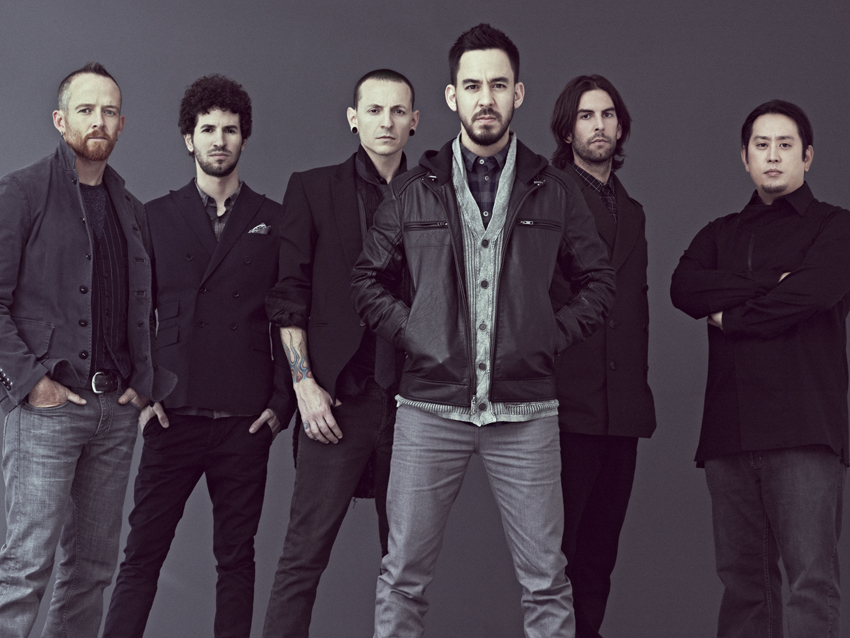
Brad Delson talks Linkin Park's upcoming, guitar-heavy new album
With Linkin Park's upcoming sixth studio album still months away from release – as of now, it's slotted for late June – guitarist Brad Delson isn't going to let all the cats out of the bag on what we can expect. But one thing's for sure, he says: Guitar solo fans will get more than their money's worth.
"There’s a lot of guitar solos on the album!" he says with a laugh. "And this is from someone who was quoted early on as saying I hated them." He catches himself and then clarifies: "Not that I hated them as a listener; I just don’t want to play any; I shirked guitar solos. Early on, I felt as though the songs we were making aesthetically didn’t want them. This new batch of songs, to me, always want solos. I feel like every song has one."
Earlier this month, fans were treated to an electrifying Delson wah solo at the end of the group's hardcore-tinged epic, Guilty All The Same. Featuring a compelling guest spot by rapper Rakim, it's a boldly original and wildly entertaining track, which, according to Delson, serves as "a battle cry for the record as a whole.”
Delson (who is co-producing with rapper and multi-instrumentalist Mike Shinoda) talked to MusicRadar recently about how the new record is coming together.
I'm curious why you decided to release Guilty All The Same So early.
“We wanted to get music out sooner than later. The timing just felt right with this song. We finished two songs relatively early in the process, and Guilty All The Same seems to inform the spirit of the record. For us, it’s the perfect lead offering to set the tone for the album as a whole.”
On Living Things, the guitars were punchier overall than on previous records. From what you're saying, you're ratcheting up the guitars even more now – and not just when it comes to solos.
“Yeah, there's way, way more guitar. Living Things certainly had a balance and energy, and it brought together the sounds of a lot of our different chapters in a new way. This record is really a musical experiment and creative endeavor unto itself. I’ve heard people say about Guilty All the Same, ‘Oh, it sounds like their older stuff,’ ‘cause it’s really heavy. But it’s not really like anything we’ve done, either. The heaviness of the track, and of what you’ll hear on other songs on the album, comes from a raw, visceral place, but it sounds distinctly its own as far as our musical history.
“I thought this was kind of funny: Mike actually described it almost a prequel to Hybrid Theory. There’s a lot of records that were influential to us – some hardcore stuff, some heavy, punk-oriented stuff – and that spirit is there. It’s like the record we might have made had we not made Hybrid Theory. It definitely goes down a different path, and it is guitar driven – that’s not an accident."
Now, how planned out is this? Did the band actually sit down and discuss a direction for the album, or were you kind of surprised to see where you were headed after you started working on it?
“A little of both, but I would say that it was much more intentional and conceptual. Per the latter, Mike demoed some stuff and has said that when he listened to it, he didn’t like it and threw it all out. One of the reasons for that – and I’m paraphrasing him, in this case – was that he felt the demos were derivative of the music he likes to listen to, but they didn’t fill a void.
“In scanning the landscape of new music, I think the void in what we heard is what motivated us to make the kind of record we’ve made. That’s sort of been the premise even when we started as a band. There’s a particular sound or a combination of things we’re not hearing. Sure, you could say, ‘A lot of groups are combining hip-hop elements and rock elements,’ but there was a very specific sound we were making and were hearing, and nobody else was doing it in that way."

Brad Delson talks Linkin Park's upcoming, guitar-heavy new album
“That’s what motivated us to make the first record, and I would say that same hunger and desire to fill a void is what motivated us to make, for us, a heavy record with a lot of technicality to it. It’s extroverted and unapologetic and demanding, and at the same time, it’s song oriented.
“There’s a lot of heavy music out there, and there’s a lot that’s experimental, and there’s a lot of great songwriting, too. Our DNA and our mission as a band is to make something specifically our own that combines these things in such a way that we’re suited to do; especially our emphasis on making that visceral, unapologetic music but still bringing to bear our love of songwriting and melody. That’s what we’ve been slaving away at every single day for the last six months.
“Even at this stage, it's interesting talking to people like yourself and hearing people's reactions to the first song. I can tell you that certain people, when they first heard it, said, ‘Are you guys f-ing crazy?’ For real. Certain people got it, and everyone ultimately came around and is on the path. To be fair, a lot of people were like, ‘The song is six minutes long. What do you mean it’s gonna be your first single?’ But for us, it’s the best thing that we’ve made that represents where we are creatively. That’s what we’re putting our weight behind.
“And then to top if off, to have a one-of-a-kind verse from arguably one of the greatest rappers of all time, that doesn’t hurt. And it’s so topical, too. Sometimes with a guest, you’ll hear a verse on a song, but it’s got nothing to do with the song the verse is on. Rakim and Mike and Chester, who obviously worked on the lyrics, had a creative mind meld in terms of elucidating the themes of the song. Rakim takes it in his own unique a direction, and it’s just beautiful. I’m so grateful to him.”
Will there be some other guests on the album?
“Yes, there will be. There’ll be a couple at least at this point, and that’s also a rarity. Certainly we’ve done collaborations and tons of things with different artists, but in terms of a proper Linkin Park album, I don’t think we’ve had any guests. On the one hand, it’s been an insular process because we’ve made the record ourselves; on the other hand, it’s been incredible collaborative because we’ve had a lot of creative people come in and out of the studio and share with us their process. At times, it’s led to them bringing their DNA into our songs. It’s been really full-on [laughs], and it’s been fun and rewarding.”

Brad Delson talks Linkin Park's upcoming, guitar-heavy new album
Living Things was a relatively brief record. Is Guilty All The Same an indication that you’re going for a longer album experience?
“Well, I don’t know if all of the songs are six minutes long, but a couple of them are. A couple of them are shorter. I feel like the creative ethos that has inspired us is not to try to imitate convention but to defy it. Sometimes that means, if a typical pop song is three minutes and 30 seconds long – or even some rock songs – then ours will be six minutes long. Or even two minutes long. It’s just about going against the grain and, again, trying to do something that we’re not hearing. That’s what inspires us to charge forward into the unknown.”
Rick Rubin co-produced the band’s last three records. What led to the band’s decision to do it themselves this time?
“Technically, we’re capable of it because we’re very hands-on. We’ve been that way in the studio throughout our entire career. Those creative with whom we’ve worked, it’s always about shaping the vision and even augmenting the creative firepower.
“In terms of the vision of this record, Mike wrote a blog for Pigeons & Planes – it was a response to an article, ‘Rock Music Sucks Now And It’s Depressing.’ Essentially, the original article said that rock music is herbivorous, and Mike was like, 'It doesn’t have to be.' This was around the time that he threw out his original ideas and changed course.
“You were asking if the album is conceptually driven, and yes, we had a very specific conceptual mission, and we knew what it was and were technically able to do that. It just came down to keeping ourselves focused and making sure that we were setting the bar high enough and getting over it.”
When you and I talked a couple of years about Living Things, you were really mixing up the guitar sounds to the point where it was hard to tell what was a guitar and what was being generated by electronics. Are you continuing that kind of experimentation?
“On this record, these guitars typically sound like guitars, but I would say that the whole palette we’re painting with has channeled a visceral energy, along with that ethos of the music that inspired us since we were teenagers, to do this in a way sonically that we haven’t heard before. It’s not to do a throwback; it’s to channel that as an ingredient and then make something uniquely our own in 2014. So I’d say that the guitars typically sound like guitars, with the caveat that you never know. This record is very unpredictable; it shirks a complacent listen.”

Brad Delson talks Linkin Park's upcoming, guitar-heavy new album
It’s interesting: Sometimes you want to subvert a guitar sound and see how far you can take it; other times, it can be just as satisfying and challenging to go back to pure, natural tone.
“Yeah. I would say there’s certainly experimentation with the guitar sounds. They’re varied, and sometimes they don’t sound like guitars, but often they do. A lot of times that came from really violent subversion of the song itself. I want the song to speak for itself, but even the fact that you’re listening to Guilty All The Same and you think you know what it is, and suddenly Rakim shows up... I wouldn’t say there’s a convention for that on a six-minute borderline punk-metal song.”
I know what you’re saying. It’s great when it all works.
“That’s right. None of this can be a contrivance; it has to come from a pure place where it just feels right.”
Absolutely. It’s funny: I was talking recently to Nick Hexum from 311 about this. He mentioned being inspired by The Beatles’ Happiness Is A Warm Gun – that's a song that never repeats itself.
“Right, exactly. So if you can make choices that are really unconventional and they still feel right, that’s a magical win. A lot of times the best versions of that are what we call ‘happy accidents.’ You’re trying to do something more straightforward, but then you go off the rails unintentionally. A lot of times when people have their adult brains on, they’ll go, ‘Oh, that was a mistake. I have to course correct and do what I set out to do.’ A child wouldn’t have that kind of self-censorship, so if you’re really in tune with creative purity, you’ll be like, ‘Wait a minute. That mistake is way cooler than what I set out to do.’ It makes no sense, but as you said, it feels great when it works.”
It can be a tricky thing. Sometimes contemplation can guide you back to the right direction; other times, it literally is about trusting your instincts and going somewhere new.
“I would say not just trusting your instincts, but celebrating your instincts. I think it’s a balance, because if you have the contemplation beforehand and you go through the micro-process of making it, when you do things that can be perceived as strange or unexpected, as long as you’re allowing that to happen and you’re looking at the big picture perspective of ‘Does that really further the intention?’ and you can say, ‘Yes, it does,’ then it works together.”
Are you using any new guitars on this album?
“We really tried to pare down our options on this record. It’s that whole paradox of choice thing. I think it’s almost essential to define a palette in which to work and then master those colors. You don’t need 20,000 guitars or 20,000 paintbrushes – you can choose three and get the same result."

Brad Delson talks Linkin Park's upcoming, guitar-heavy new album
“We’ve got two keyboards. We’ve got a few guitars we’re primarily using. We’ve got a couple of amps. You can actually do a lot with those things if you know how to use those instruments well. Our engineer, Ethan, has the list [see below], but from memory I can tell you there’s a Fender Custom Shop reissue Strat that’s my go-to every time. Because of the way it plays, I feel like I’m a better guitar player – I can play more elegantly on it. That’s high praise for an instrument. There’s also an SG. Those are the ones that stand out.
“An Orange amp is our primary amp. It’s funny: We’re always trying to improve the tone. Sometimes Mike will hear something, and he’ll say, ‘What was that?’ And the subtext is always ‘How many heads and cabinets and guitars were used?’ And the answer, kind of later in the process, is the Strat through the Orange. That’s it.
“The other thing that helps to make the sounds on the album is this unique collection of pedals. A lot of them are Ethan’s. They’re almost one of a kind, not in that only one exists, but kind of. There are things that he’s curated and collected from some random and remote places. We have about 20 or 30 of them. A lot of times I’ll want to get an unconventional sound, and Ethan will know just what to do, and those are the instances where Mike might say, ‘Is that guitar?’ He’s very discerning, so if you fool him then you’ve done something interesting.”
I know what you mean about having too many choices. When I was a kid, I didn’t know what to do with my box of 64 crayons.
“Exactly. The 64 crayons are so exciting because there’s so many of them, but really, what kid uses all 64 of them? You’re like, ‘Fuck, burnt sienna? What am I gonna do with that?' [Laughs]
According to engineer Ethan Mates, who has worked with Linkin Park since 2006, the main guitars being played by Delson and Shinoda in the studio include two of his own pieces, a 1962 Fender Stratocaster Masterbuilt Reissue and a 1978 Gibson SG. Additional guitars for tracking are a PRS SE245, a PRS Custom 25 (owned by Delson), an MJT Telecaster-style guitar and Shinoda’s ‘90s American Standard Telecaster with a maple fretboard.
Main amps for Delson and Shinoda are an Orange TH100, a Bogner Twin Jet, a Chandler GAV19T and an Engl Fireball 100.
Effects-wise, the core pedals include two by Electro-Harmonix, a Holy Grail Reverb and a HOG (Harmonic Octave Generator/Synthesizer); a Z.Vex Super Hard On preamp; a Dr.Scientist Reverberator; a Caroline KiloByte delay; and two pieces by Earthquaker Devices, a Disaster Transport Sr. (Advanced Modulated Delay & Reverb Guitar Effects Pedal) and a Hummingbird tremolo.

Joe is a freelance journalist who has, over the past few decades, interviewed hundreds of guitarists for Guitar World, Guitar Player, MusicRadar and Classic Rock. He is also a former editor of Guitar World, contributing writer for Guitar Aficionado and VP of A&R for Island Records. He’s an enthusiastic guitarist, but he’s nowhere near the likes of the people he interviews. Surprisingly, his skills are more suited to the drums. If you need a drummer for your Beatles tribute band, look him up.









